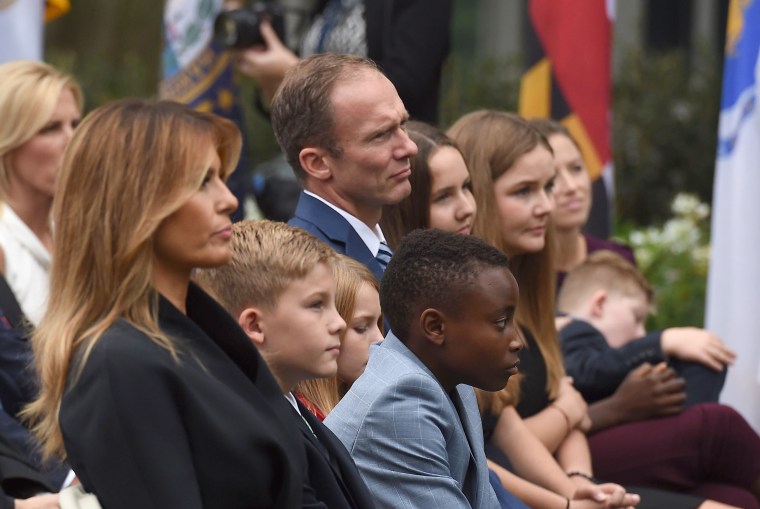
The Notre Dame law school grad and mother of seven is expected to consolidate the conservative majority.

By Pete Williams
WASHINGTON — Amy Coney Barrett, whom President Donald Trump nominated Saturday to succeed Ruth Bader Ginsburg on the Supreme Court, is an appeals court judge whose most controversial statements have come in law review articles, not legal opinions.
Barrett, 48, serves on the Seventh Circuit Court of Appeals in Chicago, appointed in 2017 by Trump and confirmed by a Senate vote of 55-43, with only three Democrats backing her. Before that, she worked briefly in private practice and then taught for 15 years at Notre Dame law school, where she earned her law degree.
If confirmed, she would keep the number of women serving on the Supreme Court at three, joining Justices Sonia Sotomayor and Elena Kagan. Barrett would be the only justice on the current court who did not graduate from an Ivy League law school, adding another element of diversity.
Barrett would also make the court solidly conservative, joining Chief Justice John Roberts and Justices Clarence Thomas, Samuel Alito, Neil Gorsuch and Brett Kavanaugh in providing what could be a six-vote majority.
A devout Catholic, she has the backing of evangelicals who consider her a likely vote to overturn the Roe v. Wade abortion decision.
Although she was not on the original list of potential Supreme Court nominees released by the Trump campaign, Barrett was added shortly after taking a place on the appeals court bench. Trump considered her to succeed the retiring Justice Anthony Kennedy two years ago before settling on Kavanaugh.
She would become the youngest member of the Supreme Court, able to serve for decades to come. A native of New Orleans, she graduated from Rhodes College in Tennessee before moving to Notre Dame’s law school.
She was a law clerk to a federal appeals court judge in Washington and later to Supreme Court Justice Antonin Scalia. The Scalia family was at the White House, along with Barrett’s family, for Trump’s Rose Garden announcement Saturday.
Barrett called Scalia her mentor and said he had an «incalculable influence» on her.
Her husband, Jesse, is a federal prosecutor in Indiana, and they have seven children, including two adopted from Haiti. She joked during remarks in the Rose Garden that her children had recently informed her at a family dinner that their father is the better cook in the house. Barrett was recognized at the event by Trump as the only Supreme Court justice in history to have school age children.

Barrett’s law review articles have drawn considerable scrutiny.
In 1998, while serving as an appeals court law clerk, she and a Notre Dame professor wrote that «Catholic judges (if they are faithful to the teaching of their church) are morally precluded from enforcing the death penalty» and they argued that the church’s prohibition against abortion is absolute.
In a 2003 article, she questioned the reluctance of federal courts to overturn dubious precedents that have come to be relied upon by judges and the public, suggesting that a key Supreme Court decision upholding Roe v. Wade and the right to abortion was wrongly decided.
In a 2013 speech at Notre Dame, she said the Roe decision «ignited a national controversy» and created a political backlash known as «Roe Rage.» She also said it was «very unlikely» that the Supreme Court would ever overturn the core protection of abortion rights, according to Notre Dame’s magazine.
But taking all her comments into account, many conservatives considered her a safer choice than Barbara Lagoa of Florida, also on Trump’s short list, who has said almost nothing about Roe v. Wade.
At Barrett’s confirmation hearing for the appeals court, Sen. Dianne Feinstein, D-Calif., said, «Whatever a religion is, it has its own dogma. The law is totally different.» Addressing Barrett, Feinstein continued, «The conclusion one draws is that the dogma lives loudly within you.»
That remark was widely condemned by religious groups. The Catholic Register called it «one of the most memorable and disturbing political exchanges» and said it raised the specter of constitutionally prohibited religious tests for public office.
Barrett told the hearing, «My personal church affiliation or my religious belief would not bear in the discharge of my duties as a judge.» And she said that with the benefit of 20 years of experience and the ability to speak solely in her own voice, she would not say the law review article on the duty of Catholic judges reflects how she views those issues «in every particular.»
As a judge, she has been a strong supporter of gun rights.
Despite her apparent views on abortion, she voted to uphold a Chicago law preventing abortion opponents from approaching women entering a clinic. And she wrote a decision making it easier for students disciplined by universities for sexual misconduct to sue when they claim they didn’t get a fair hearing.
Barrett’s confirmation hearings before the Senate Judiciary Committee are scheduled for mid-October. Her past writings on Obamacare, among other things, are likely to face scrutiny from Senate Democrats.
Pete Williams is an NBC News correspondent who covers the Justice Department and the Supreme Court, based in Washington.
